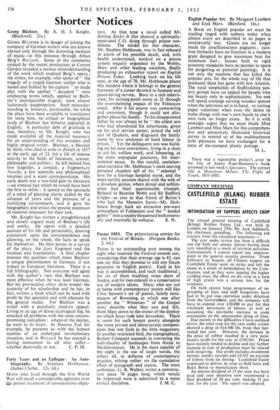Shorter Notices
GEORG BI:JCHNER is in danger of joining the company of German writers who are known abroad only through the distorting medium ot music—in this instance through Alban Berg's Wozzeck. Some of the comments eioked by the recent production at Covent Garden revealed a serious misunderstanding of the work which inspired Berg's opera ; the critics, for example, who spoke of " the tragedy of a stupid German soldier who is teased and bullied by his captain "or made play with the epithet " decadent " were employing terms which, applied to Bilch- ner's incomparable tragedy, were almost ludicrously inappropriate. Such misunder- standing is, however, pardonable, for while the plays have been available in translation for some time, no critical or biographical study of BUchner has hitherto appeared in English. A particular debt of gratitude is due, therefore, to Mr. Knight, who has made available all the material necessary for an understanding of this complex and highly original writer. Buchner, a Hessian by birth, who died in exile in Zurich in 1837 at the early age of 23, led a life of intense activity in the fields of literature, science, philosophy and politics ; he left behind him two tragedies, a comedy, a fragmenti.ry Novelle, a few scientific and philosophical treatises and a scant correspondence. His early death was a two-fold gain to literature —an ironical fact which he would have been the first to relish : it spared us the spectacle of a mind of piercing clarity dulled by the advance of years and the pressure of a stultifying environment, and it gave his biographers and critics the precise minimum of material necessary for their task.
Mr. Knight has written a straightforward and closely argued study of Buchner's life and works. He opens with a detailed account of his life and personality, drawing extensively upon the correspondence and allowing, on the whole, the facts to speak for themselves. He then passes to a survey of the plays, the Lenz fragment and the treatises and translations. A final chapter assesses the qualities which make Buchner a unique phenomenon in German, if not indeed in European literature. There is a full bibliography. Not everyone will agree with the author's view that Buchner was most effective when he was least German. But his provocative obiter dicta temper the austerity of his scholarship and he has, in fact, written a book which can be read with profit by the specialist and with pleasure by the general reader. For Buchner was a writer with a peculiarly modern appeal. Living in an age of dense ideological fog, he attacked all problems with the same uncom- promising radicalism : whatever the matter, he went to its heart. In Dantons Tod, for example, he presents us with the human realities of an archetypal revolutionary situation, and in Wozzeck he has erected a lasting monument to all who suffer— whether deservedly or not. C. P. M.


































 Previous page
Previous page